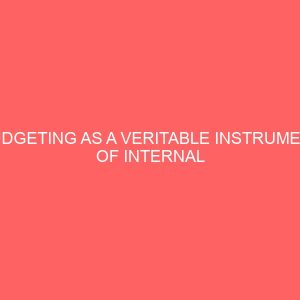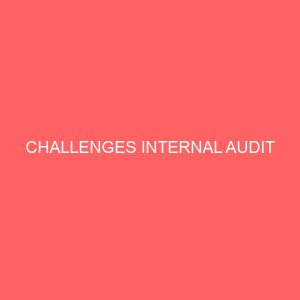Description
CHAPTER ONE
INTRODUCTION
1.1 Background of the Study
This project is on Budgeting as a veritable instrument of internal control (Nigerian brewery). Budgeting for any business is a basic and essential process that allows businesses to attain many goals in one course of action. There are several goals that many businesses seek to achieve (or should be trying to work toward) when they create and implement a budget. These goals include control and evaluation, planning, communication, and motivation, (Kariuki, 2010) suggests that budgeting is a process of planning the financial operations of a business.
Budgeting has been recognized as a management tool that helps to organize and formulize management’s planning of activities, it is also seen as a financial tool that is useful for both evaluation and control of organizations for the planning of future activities. Application of these tools can greatly impact the performance of a company (Larson, 1999).
Horngren and Foster (2003), defined budget as a quantitative expression of a plan of action and an aid to coordination and implementation. In budgeting there is need for setting of goals on the premise of having objectives and keeping resources. The process of planning requires that managers of business to act as if they are fortune tellers and attempt to predict the future course of action to be adopted. Such prediction of the so-called fortune tellers will determine whether or not the objectives of the firm will be met.
Adams (2009), views budget as a future plan of action for the whole organization or a sector thereof. Budgets are plans that deal with future allocations and utilization of resources to different activities over a given period of time. For any organization to make progress or achieve its goals, it needs capital and to be able to make profit, it requires planning of its resources, which can only be achieved through budgeting, hence budgeting serves as a tool for financial planning.
Krientner and Kinicki (2008) defined internal control as a process designed to provide reasonable assurance that the organization produces reliable financial reports, complies with applicable laws and regulations, and conducts operations in an effective manner.
According to Enudu (1999), the business environment is characterized by a lot of uncertainties ranging from such factors as: Economic environment, political and legal factors, social environment, supply and demand forces, competition, consumers’ attitude and technological changes.
According to Drury (2000), proper planning of business helps in reducing uncertainties thereby providing the management of these enterprises with a clear direction by determining their courses of actions in advance.
According to Pandey (2010), for any enterprise to achieve these goals and objectives, they must be managed effectively and efficiently. Management is efficient if it is able to accomplish the objectives of the enterprise and becomes effective when it accomplishes the objectives with minimum efforts and costs. One of the ways in which the management can achieve these objectives is though profit planning and control or budgeting.
According to Nweze (2011), Budgeting in its true word is the design of the future state of an entity and the effective ways of bringing it about. Budgeting or planning involves the determination of the future course of actions for accomplishing the objectives of the enterprise.
According to Lucey (2002), the main purpose of budget planning is to provide the necessary guidelines for making decisions. With the proper budget planning, the enterprise can no longer be under the mercy of whims of Fickle economic and social forces thereby relying on the ability to sense what is required. (Nweze 2011).
The value of budgeting control of any organization can never be overemphasized as these organizations and companies have limited resources and these scarce resources impose limits on the number of extent and range of end result the organization was set out to achieve.
According to Nwoha and Ekwe (1999), some of these goals include maximizing profit or achieving some satisfactory level of performance, profit satisfaction achieving continual growth or ensuring the survival of the organization avoiding risk in making investment and performing a social services desired by others.
According to Nweze (2011), a budget therefore co-ordinates the separate plans of different departments in an organization be it manufacturing concerns or non-manufacturing concerns and provides means of bringing both the marketing, production and financial activities of the organization together.
With proper co-ordination of the various activities of organizations especially manufacturing concerns by their management is the main focus of this study.
1.2 Statement of the Problem
Budgeting in a business has benefits and consequences that go beyond the organization’s management and have more to do with financial dimension in general, as budgeting forces business management to do better forecasting. Vague generalizations about what the future may hold for the organization are not good enough for assembling a budget, its of high importance that management must put their predictions into definite and concrete forecasts (Tracy, 2013). Budgeting motivates managers and employees by providing useful yardsticks for evaluating performance. Budgets provide useful information for superiors to evaluate firm performance and inform financial allocation strategies across various components of a firm Horngren and Foster (2003). Over the years, companies has undertaken various attempts aimed at improving its budgetary process with the objectives of imposing greater fiscal discipline on management agencies of both private and public companies, today most companies boasts of having a strong detailed and well laid budgeting process which the top executives uses as a tool to allocate revenue resources (Anderson, 1996), as through a proper budgetary process internal control can be assured for the business to grow.
This study is based upon understanding why budgeting is necessary to businesses and also why it can be seen as a veritable instrument of internal control as profit is necessary for businesses to grow. The choice of the manufacturing firm is because it has been in existence for long and has proven to withstand the economic issues so far in Nigeria.
1.3 Aim and Objectives of the Study
The aim of this study is to understand the importance of budgeting as a veritable instrument of internal control
The specific objectives are;
- To find out whether or not manufacturing business organizations control their levels of profit making and the means used to achieve
- To examine whether the manufacturing business concerns in Nigeria plans their profits hence their losses are unnecessarily large in relation to their budget estimate.
- To identify the types of budgeting in some of the manufacturing business concern in Nigeria that enhance efficiency.
1.4 Research Questions
- Does the manufacturing business organization control their levels of profit?
- Does manufacturing business concerns in Nigeria plans their profit hence their losses are unnecessarily large in relation to their budget estimate?
- Does the types of budgeting in some of the manufacturing business in Nigeria enhance efficiency?
1.5 Hypotheses of the Study
To identify the achievements of the desired objectives, the following hypotheses are formulated:
Hypothesis I
H0: Manufacturing business organization do not control their levels of profit making and the means used to achieve it.
H1: Manufacturing business organization do control their levels of profit making and the means used to achieve it.
Hypothesis II
H0: Manufacturing business concerns in Nigeria do not plan their profit hence their losses are unnecessarily large in relation to their budget estimate.
H1: Manufacturing business concerns in Nigeria do plan their profit hence their amount of losses is not unnecessarily large in relation to their budget estimate.
HYPOTHESIS III
H0: The type of budgeting in some of the manufacturing businesses in Nigeria is not efficient.
H1: The type of budgeting in some of the manufacturing businesses in Nigeria is efficient.
1.6 Significance of the Study
This study is beneficial to manufacturing companies, who produce products for the consumption of their customers.
Also, it will show why profit planning is very vital for any manufacturing establishment that wishes to survive.
It will help the manufacturing company to determine and maintain an acceptable level between high profit and low profit at a given time thus leading them to attain the various organizational goals and objectives.
1.7 Scope of the Study
Due to the cost effectiveness of this research and time, this research has been conducted in Nigerian Breweries Onitsha, Anambra state.
1.8 Limitations of the Study
As a result of these constraints (time and money) this study was limited to Nigerian’s famous brewery in Anambra State, Nigerian Breweries Onitsha in Anambra state.
1.9 Definition of Terms from oxford learners dictionary
Business: A person’s regular occupation, profession, or trade.
Efficient: A firm is said to be efficient if it can manage their resources well
Effectiveness: This entails proper co-ordination of these limited resources in form of both human and material resources to combat their responsibilities
Planning: The design of a desired future state of an entity and the effective ways of brings it about.
Goals: Performances can be defined as the assessment of the company towards reaching the targeted goals and objectives.








Reviews
There are no reviews yet.